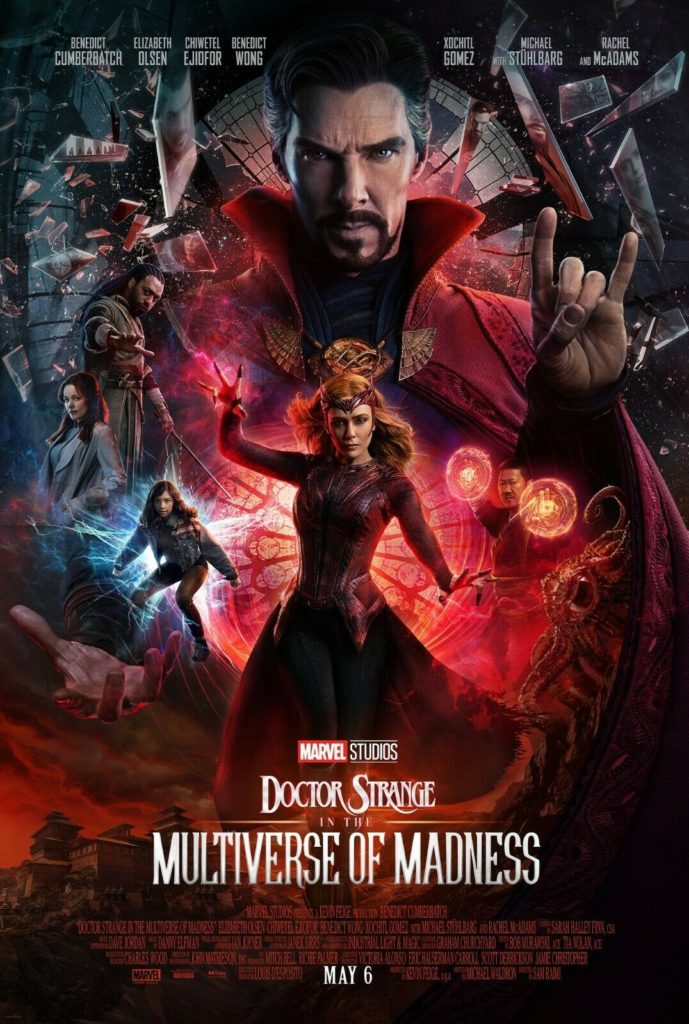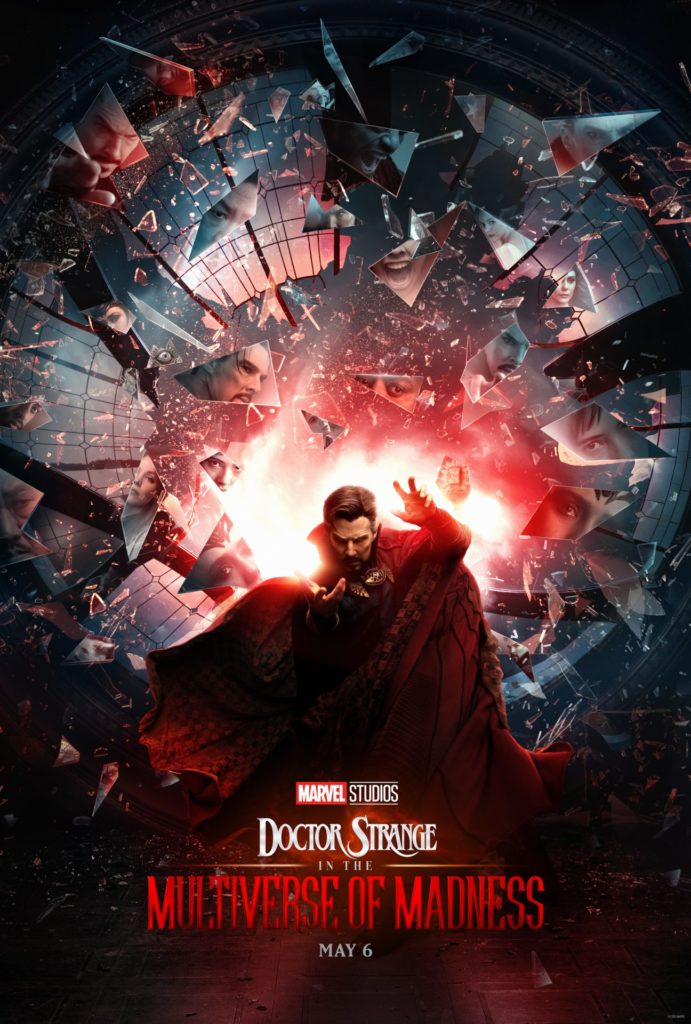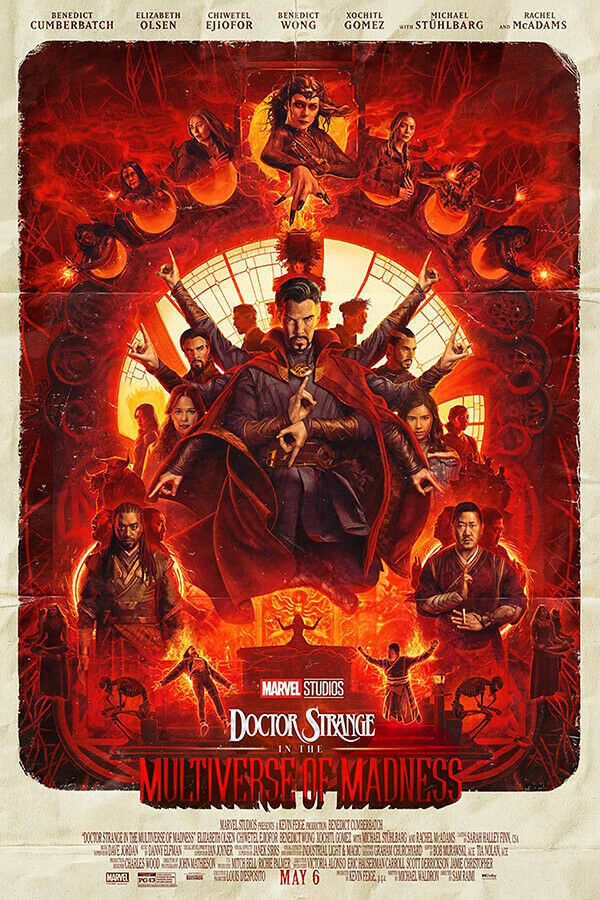I’ll put the spoiler warning for Doctor Strange In The Multiverse Of Madness right up here (as if the title of this article wasn’t enough of a giveaway).
First, my succinct review of the film: It was exactly what I expected an MCU movie directed by Sam Raimi would be, and I very much enjoyed it. I hope it inspires Kevin Feige, and the powers-that-be, to let other filmmakers imprint their style on future MCU films. The movies that James Gunn and Taika Waititi directed showed a little of this, and Chloe Zhao got some of her stuff in. But, if the MCU is to truly evolve and last into the future, letting the directors make their individual movies stand out is the way to go.
Now, onto the hot topic that has grown from many people who have seen the film over the course of its opening weekend. A number of takes state that Wanda Maximoff AKA The Scarlet Witch fell into one of two problematic story tropes: The “hysterical woman” or “women can’t be trusted with power” tropes. I do not believe that Wanda falls into either of these tropes, rather, she’s more in-line with two different, much less reductive tropes: “The desperate parent” and “The overpowered character.”
Some Context: When last we saw Wanda in the finale of WandaVision, she had taken down her “Hex” that had unintentionally (more or less) imprisoned the citizens of Westview, New Jersey. The spell she had cast was really just her way of resolving the existing trauma stemming from the deaths of her parents, her brother, and Vision. However, taking down her Hex created an even more devastating new trauma. She had created children while in the Hex – twin boys Billy and Tommy. Tragically, this meant that they could only exist within the Hex and were erased (for lack of a better term) when Wanda undid the spell.
In almost every way, Billy and Tommy were living beings. They had their own thoughts, their own personalities, and perhaps even their own souls. But being created by Wanda’s magic, and her love, tied them to the Hex. In the actual last scene we saw Wanda in prior to the new film, she had fully embraced her title of Scarlet Witch in an isolated cabin, where she was studying an ancient book of dark magic called the Darkhold. The last thing we heard in that scene were Billy’s and Tommy’s voicing calling out for help. Anyone who thought Wanda was studying the Darkhold for reasons other than to get her children back was sorely mistaken.

In Doctor Strange In The Multiverse Of Madness, Wanda is hunting America Chavez, a teenage girl with the power to travel through the multiverse (the multiverse itself, having been created during the events of the Loki season finale). But, since Chavez cannot willingly control this power, Wanda’s plan involved stripping it from her – likely killing her in the process. Wanda does kill a lot of people in the film, but it’s not exactly like she’s punching below her weight class (besides the fact that everyone is below her weight class, which we’ll get to in a bit).
She attacks Kamar Taj, resulting in the deaths of numerous sorcerers. Later, she dreamwalks (controls the mind of a different universe’s Wanda) to kill the Illuminati. That universe’s Illuminati is not the primary MCU’s (finally officially labeled 616) and consists of Mr. Fantastic, Captain Marvel, Black Bolt, Captain Peggy (super soldier) Carter, and Professor X – some true heavyweights of superherodom. Wanda makes fairly quick (and grisly) work of them while barefoot, and wearing pajamas in someone else’s body. It’s honestly about the most bad ass thing anyone has ever done in the MCU to date.
Since we’re already here, I’ll get into the first of the tropes I mentioned earlier “the overpowered character.” This one simply states that the most powerful character at the beginning of the story cannot be the true hero of the story. The reason is simply that there is very little drama to be had if it’s already established that the hero can defeat the villain. Wanda unlocked the powers of The Scarlet Witch at the end of WandaVision, so if she was on fighting alongside the heroes this likely would have been a much shorter movie. As such, she either had to be sidelined somehow early on, or she had to be the villain of the story. Since the filmmakers wanted her to play a major role in the film (and justifiably so, because Elizabeth Olsen is great, and some of Wanda’s flexes are truly awesome) they chose the latter.

Now, onto Wanda’s motivations. I have two kids of my own (aged 6 and 3) and there is absolutely nothing I wouldn’t do to protect them, or to save them if (god forbid) the need ever arose. So, I totally get where Wanda is coming from. The trope of a mother or father doing whatever is possible to save their children – the “desperate parent – is as old as any. If Vision and Wanda had swapped places, the story would be the same. The right choice was made here, as Wanda has always been a more interesting character that Vision. But, my point is that it’s not exclusive to moms (Happy Mothers’ Day to all the mom’s out there, btw, if you’re reading this on it publishing date).
It’s established in the movie that the Darkhold exacts a heavy toll on its user. It’s also said in clear terms that the (again, ancient book of dark magic) is exerting an influence on Wanda. So, that needs to be coupled with her personal motives to understand the whole picture. But I also want to bring the end of Wanda’s arc into the light here. She is ultimately stopped when America Chavez, finally able to control her power, opens a portal to the universe that Wanda had invaded earlier. There, 616 Wanda interacts directly with that universe’s Billy and Tommy. The boys are terrified of her, as they watch her attack their mother. This is what finally begins 616 Wanda’s breakthrough.
The resolution comes when the other Wanda makes use of her (and everyone’s) true superpower: Forgiveness. Despite being possessed, and made to murder people, this Wanda empathizes with 616 Wanda. She understands her pain, and assures her that Billy and Tommy will be loved. It’s only then that 616 Wanda finally accepts that what she was trying to do is wrong. She finally accepts that it’s time to let go. She destroys the Darkhold, and seemingly herself (but, c’mon, we all know better) knowing that she must be stopped. Knowing that she’s the only one who can stop herself.
Dr. Strange almost gets her to this place very early in the movie, asking her to consider how the boys would react to being stolen from their real mother. But, as she’s momentarily distracted, he attacks her with magic hand snakes, and everything goes south for a while. Dr. Stephen Strange’s poor bedside manner strikes again! Anyway, if he had had been able to talk her down, we never would have gotten all the insane multiversal madness that we came for.
Wanda Maximoff had the best part, and was the driving force, in the film. This combination is somewhat rarer than you might think. And Elizabeth Olsen knocks it out of the park. She is the heart of the story, as dark and twisted as that heart might have become before seeing the light. I do hope that performance ends up outlasting the characterization criticisms as the legacy of Doctor Strange In The Multiverse Of Madness.
